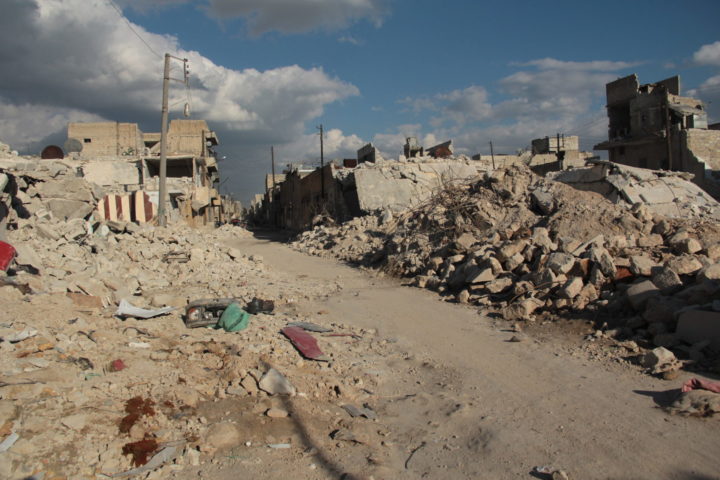This week while attention in the Middle East was focused on talks between Iran and other world powers to re-establish the Iran Nuclear Deal and get the USA re-signed up to it, a report came out of the Organization for the Prohibition of Chemical Weapons (OPCW) in The Hague, Netherlands, that there are “reasonable grounds to believe that at approximately 21:22 on 4 February 2018, a military helicopter of the Syrian Arab Air Force under the control of the Tiger Forces hit eastern Saraqib by dropping at least one cylinder. The cylinder ruptured and released chlorine over a large area, affecting 12 named individuals.”
This new allegation of chemical weapons use would be a clear violation of the Chemical Weapons Convention which the Syrian government signed up to in 2013. However, Damascus angrily denied the OPCW report. “The Syrian Arab Republic condemns, in the strongest terms, what has been included in the report of the illegitimate so-called “Investigation and Identification Team” and rejects all its context,” a statement issued by the Foreign Ministry said.
This is not the first time that OPCW reports have been rejected by Syrian authorities, as it follows reports into attacks in Douma and Ghouta which have also been denounced. In fact, documents surrounding the Douma report have been published by Wikileaks and show the amount of dissent from within the OPCW’s own investigating team when the official report concluded that blame lay with the Syrian government. This shines a spotlight on all kinds of murky dealings happening within the OPCW which is meant to be without any kind of institutional or political bias.
In the state of civil war within Syria, the problem lies with getting forensic investigators into the location of alleged attacks and ensuring the veracity of the eye witness reports and the videos and photos that subsequently circulate on the internet, not to mention the enormous problem of ensuring that samples sent to OPCW testing labs have not been planted by those with vested interests in toppling the government of Bashar Al-Assad.
The problem of unreliable evidence was brought into sharp relief in the Douma incident, because it happened in a location over which government control was rapidly regained, thus allowing investigators in. The problem that the whistle-blowers of that report recognised, was that there is no smoking gun, there is no concrete evidence that unequivocally proves that the Syrian government is attacking its opponents with chemicals.
This is not to say that the Assad government hasn’t used chemicals on its own people, but it defies all logic to think that, knowing full well the international outrage any use of chemical weapons would generate, someone in Damascus would give the order to use them. Have we really learned nothing from the war in Iraq on the basis of fabricated allegations of weapons of mass destruction programmes? Are we really going to start another war in Syria on the basis of “reasonable grounds to believe”? Hundreds of thousands of people in Syria will definitely die in any such war.
And, this is even more serious because the conflict in Syria in reality is a proxy war between the USA and Russia, and this battle is being fought on several fronts.
In 2018, allegations of Russian involvement in the poisoning of a former Russian spy and his daughter in Salisbury, England resulted in a diplomatic conflict that resulted in dozens of Russian diplomats located in countries all over the west being expelled. The fact that no evidence could ever be provided to tie the alleged poisoning to the two Russian suspects identified in photographs, the incoherent timeline proposed by the UK police, and the subsequent unquestioned vanishing of the two Russian victims didn’t stop the anti-Russia hysteria in the mainstream media from reaching fever-pitch.
And today, news comes from the Czech Republic trying to blame Russia for an explosion that occurred back in 2014.
And in the meantime, the conflict in the Ukraine is building, tensions are mounting and the potential for all-out war looms on the horizon.
For sure there are those who benefit from war, any war. It is up to us as individuals to ensure that if decisions are taken to go to war, the information on which it is based is sound.
In an interview last week with Dr Piers Robinson of the Organisation for Propaganda Studies in the UK, on the subject of the latest OPCW report, he said, “I think democracy requires people to work hard, right? People have to think and think for themselves, but people can do that. And I think if people separate themselves from adherence to mainstream media, look at this rich variety of independent media out there, think, and think for themselves. Go and look at the primary documents which are circulating about the OPCW. Don’t take the word of a journalist or me. Let’s just look at the documents which are available and then use their own intelligence. It’s hard work but that’s what democracy is. I think democracy involves hard work from citizens. If we’re apathetic, we lose democracy, right?”






